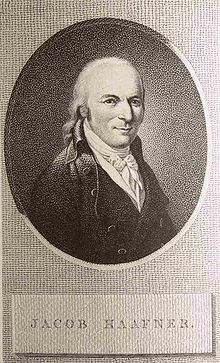Jacob Haafner
Jacob Gottfried Haafner (born May 13, 1754 in Halle an der Saale , † September 4, 1809 in Amsterdam ) was a German-Dutch East Indiaman and travel writer.
Life
Haafner grew up in confessional and economically difficult circumstances: The father, who was destined to be a monk by his Catholic, Alsatian parents, had escaped from the monastery and studied medicine in Halle . When a child (Jacob Haafner) was announced, he married and adopted the Lutheran denomination , which led to disinheritance by the parents. Since his father's practice in Halle, Emden and Amsterdam, where the family had moved, did not develop as desired, he joined the Dutch East India Company as a ship's doctor in 1766 . On the voyage to India - the eldest son Jacob accompanied him - the father died on board off the South African Cape; Haafner was left on his own at the age of 13.

In his multi-volume work, primarily of a biographical and novel-like nature, which he wrote after returning to his Dutch homeland, Haafner describes the 23 years of his life in Asia in an abundance of vividly told scenes and facts on the basis of his notes in five volumes. In front of the reader's eye, the life on board the ships and in the trading offices, but above all the world of the South Indian, Bengali, Indonesian and Sinhalese locals emerges in a multi-faceted, often gripping and sometimes moving way.
Haafner's talent for languages - in addition to knowledge of Latin and Sanskrit, he mastered French, German, Dutch, English and Tamil and had a basic knowledge of Malay and Sinhala - vouched for the authenticity of his reports, and his contemporaries valued him for his wakefulness, despite the sheer unbelievable wealth of experiences , impartial comprehension. The realism and independence of Haafner's reports were often confirmed in detail in the Dutch and German new editions; No references to literature could be found.
Impoverished by the devaluation of French government papers in 1796, Haafner had to struggle with his family in Amsterdam in the last years of his life. After his death due to a heart condition in 1809, his son took over the publication of the posthumous writings.
reception
Haafner is one of the early romantic authors of the Netherlands who - rarely for Dutch literature - found an echo abroad. Because of his attention to detail he is considered a valuable contemporary witness; his radical colonial criticism , which later found its best-known representative in Multatuli , his unconditional advocacy for the rights of the locals and his style, which was praised as fraai (“beautiful”) and boeiend (“exciting”), make him one of the best despite some weaknesses of the presentation Human and literary author of his time.
Works
- Single issues
- Thomas Kohl (Ed.): Journey in a Palankin . Experiences and incidents on a trip along the Coromandel coast of South India. ("Charms in a Palanquin"). Gutenberg-Buchhandlung, Mainz 2003, ISBN 3-923961-10-3 .
- Thomas Kohl (Ed.): Journey to Bengal and return journey to Europe. On the basis of his postponed papers. ("Reize naar Bengal en terugreize naar Europa"). Gutenberg-Buchhandlung, Mainz 2004, ISBN 3-923961-11-1 .
- Thomas Kohl (Ed.): Journey on foot through the island of Ceylon. ("Reize to voet door het eiland Ceilon"). Gutenberg-Buchhandlung, Mainz 2004, ISBN 3-923961-12-X .
- Thomas Kohl (Ed.): Experiences and earlier sea voyages. Edited by CM Haafner based on the papers in the estate. ("Lotgevallen en vroegere Zeereizen"). Gutenberg-Buchhandlung, Mainz 2006, ISBN 3-923961-13-8 .
- Thomas Kohl (ed.): Experiences on a journey from Madras to Ceylon. ("Lotgevallen op eene reize van Madras over Tranquelaar naar het eiland Ceilon"). Gutenberg-Buchhandlung, Mainz 2006, ISBN 3-923961-14-6 .
- Work editions
- Jaap A. de Moor, Paul G. van der Velde (eds.): De werken van Jacob Haafner. Edition Walburg, Zutphen 1992/97 (3 vols.).
- 1992, ISBN 90-6011-777-8 (= works van de Linschoten-Vereeniging ; vol. 91).
- 1995, ISBN 90-6011-943-6 (= works van de Linschoten-Vereeniging; vol. 94).
- 1997, ISBN 90-6011-994-0 (= Werken van de Linschoten-Vereeniging; Vol. 96).
- Jaap A. de Moor, Paul G. van der Velde (eds.): Negotiating over het use of zendelingen en zendelings-genootschapen. Een Kritiek op zending en kolonialisme. Verloren, Hilversum 1993, ISBN 90-6550-377-3 (reprint of the Haarlem edition 1807).
literature
- Friedrich Ratzel: Hafner, Jacob . In: Allgemeine Deutsche Biographie (ADB). Volume 10, Duncker & Humblot, Leipzig 1879, p. 322 f.
- Heert Terpstra: Jacob Haafner and his views of colonialism. In: Marie A. Meilink-Roelofsz (Ed.): Dutch authors in Asian history. A selection of Dutch historiography on the Verenigde Oostindische Compagnie . Foris Publ., Dordrecht 1988, ISBN 90-6765-446-9 , pp. 400-427.
- Paul van der Velde: How onder palms leeft. De sublieme wereld van Jacob Haafner (1754-1809). Bakker, Amsterdam 2008, ISBN 978-90-351-3241-2 .
- Jean P. Vogel: Jacob Haafner. Schets uit de laatse jaren the Oost-Indische Compagnie. DeBussy, Amsterdam 1900.
Web links
- Literature by and about Jacob Haafner in the catalog of the German National Library
- www.jacob-haafner.de
| personal data | |
|---|---|
| SURNAME | Haafner, Jacob |
| ALTERNATIVE NAMES | Haffner, Jakob; Haafner, Jacob Gottfried; Haafner, Jacob Godfried |
| BRIEF DESCRIPTION | German-Dutch travel writer |
| DATE OF BIRTH | May 13, 1754 |
| PLACE OF BIRTH | Halle on the Saale |
| DATE OF DEATH | September 4, 1809 |
| Place of death | Amsterdam |
